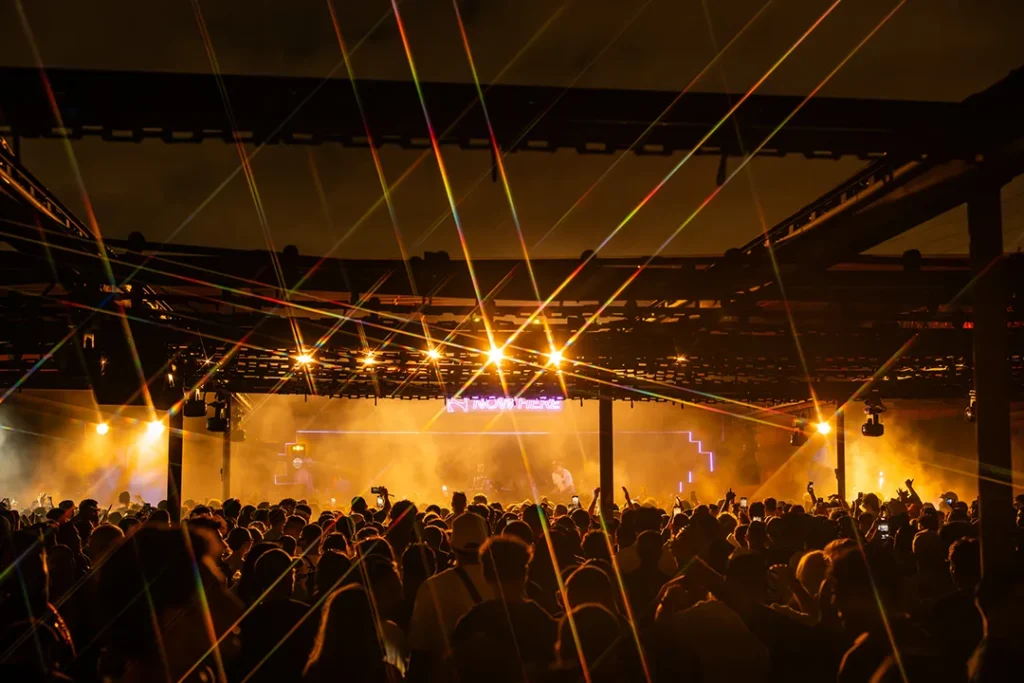
The ongoing legal dispute between Miami’s Club Space and Factory Town operators and Insomniac has moved on to another phase. This week, the team behind the popular venues, CDD Holdings, and its principals, David Sinopoli, Davide Danese, and Jose “Coloma” Cano filed a counterclaim against Insomniac and its CEO Pasquale Rotella in the U.S. District Court for the Southern District of Florida. Additionally, internal documents indicate that Space and Jose Coloma Cano have parted ways, which we can only assume is related to the ongoing dispute.
The counterclaim comes in response to a lawsuit Insomniac filed on August 4, accusing CDD of breach of contract and bad faith during negotiations over a stake in the Factory Town property. At the center of the dispute is a mediated settlement agreement the parties reached in July after a 16-hour long session with Judge Michael Hanzman. That agreement required both sides to collaborate on two upcoming Factory Town events: the Halloween-season Hocus Pocus festival and a show planned for Miami Art Basel.
The initial lawsuit, filed by Insomniac, claims that its former partners at CDD made “outrageous demands” last year for a larger share of money and control over Factory Town.
However, a countersuit from CDD tells a story of betrayal. They allege that Insomniac “methodically and unilaterally” worked to dismantle CDD’s financial and ownership rights. The ultimate aim, they claim, was to leave the promoters “trapped and forced to accept ever-worsening conditions.”
According to CDD, their original agreement for the Factory Town venue explicitly promised them a 49% ownership stake. Their counterclaim argues that this promise was never genuine:
“Insomniac’s and Rotella’s actual intent was to gain full control of the Factory Town venue, obtain a lease for the Factory Town property under only Insomniac’s name, and then unilaterally rewrite the deal under which the CDD Parties had performed and under which the CDD Parties exceeded all expectations, leaving the CDD Parties with all the work, all the risk, and a drastically reduced upside.”
This past summer, the two sides entered mediation and appeared to find a resolution. They emerged with a settlement agreement in which Insomniac would buy out CDD for $3 million and assume complete control of Factory Town. But the truce didn’t last. A new lawsuit from Insomniac alleges that CDD has already breached the settlement by interfering with the planning of major upcoming events, including the Hocus Pocus Halloween party and programming for Art Basel Miami in December.
Once again, CDD’s countersuit offers a conflicting narrative. They contend that the settlement actually required Insomniac to collaborate with them on both Hocus Pocus and Art Basel. They accuse Insomniac of violating the deal by booking talent without their approval and ignoring a flood of emails, copies of which were submitted as evidence in the suit.
As a prime example of this alleged breach, CDD points to an offer Insomniac made to the popular party brand Circoloco, which “represented a 44% increase from the prior year’s deal.” CDD says they immediately objected to the costly offer, stating that it did “not reflect historical performance, venue capacity, or the reality of our shared structure.” The countersuit alleges that Insomniac simply ignored their follow-up emails (which were attached to the Counterclaim) regarding the details of the deal, moving forward without their input.
The dispute has also turned personal regarding Pasquale Rotella, the President and face of Insomniac. nsomniac’s lawsuit alleges that the CDD partners had been planning a “smear campaign” against its chief executive.
While CDD’s legal team denies this specific charge, their own court filings contain some of the most blistering language in the dispute. After mentioning the world-famous entrepreneur’s past run-ins with the law, the complaint states:
“Rotella is not just a criminal and a fraud. He is also insufferable to work with. The CDD Parties have had the misfortune of witnessing and experiencing first-hand Rotella’s cruelty, self-centeredness, and volatility towards his business partners and/or employees.”
Industry insiders familiar with the dispute have indicated that the conflict extends beyond just Factory Town and reflects a broader fear about Insomniac’s market dominance, fearing that Insomniac is becoming monopolistic and killing competition to block out independent promoters in key markets.
In addition to breach of contract, CDD is pursuing claims of fraudulent inducement, breach of fiduciary duty, unjust enrichment, and quantum meruit, seeking damages for what they describe as Insomniac’s “stonewalling.” Insomniac has pushed back, with attorney Jordan Shaw dismissing the filing as “an ad hominem attack disguised as a pleading.” Shaw argues that CDD’s claims lean on irrelevant personal history including years old social media posts and dropped charges from decades ago rather than the contractual issues at hand.
Insomniac is seeking the return of a $2.9 million settlement payment and injunctive relief, while Factory Town’s team hopes to establish that Insomniac acted in bad faith and violated binding obligations. Club Space and Factory Town have over the last few years become some of Miami’s most important dance music venues, while Insomniac remains the most influential festival promoter in North America. This legal clash isn’t just about money or contracts. It’s setting a precedent for whether grassroots organizers can coexist with big business in today’s dance music ecosystem.
The post Club Space Operators File Counterclaim Against Insomniac in Escalating Legal Battle appeared first on EDMTunes.





